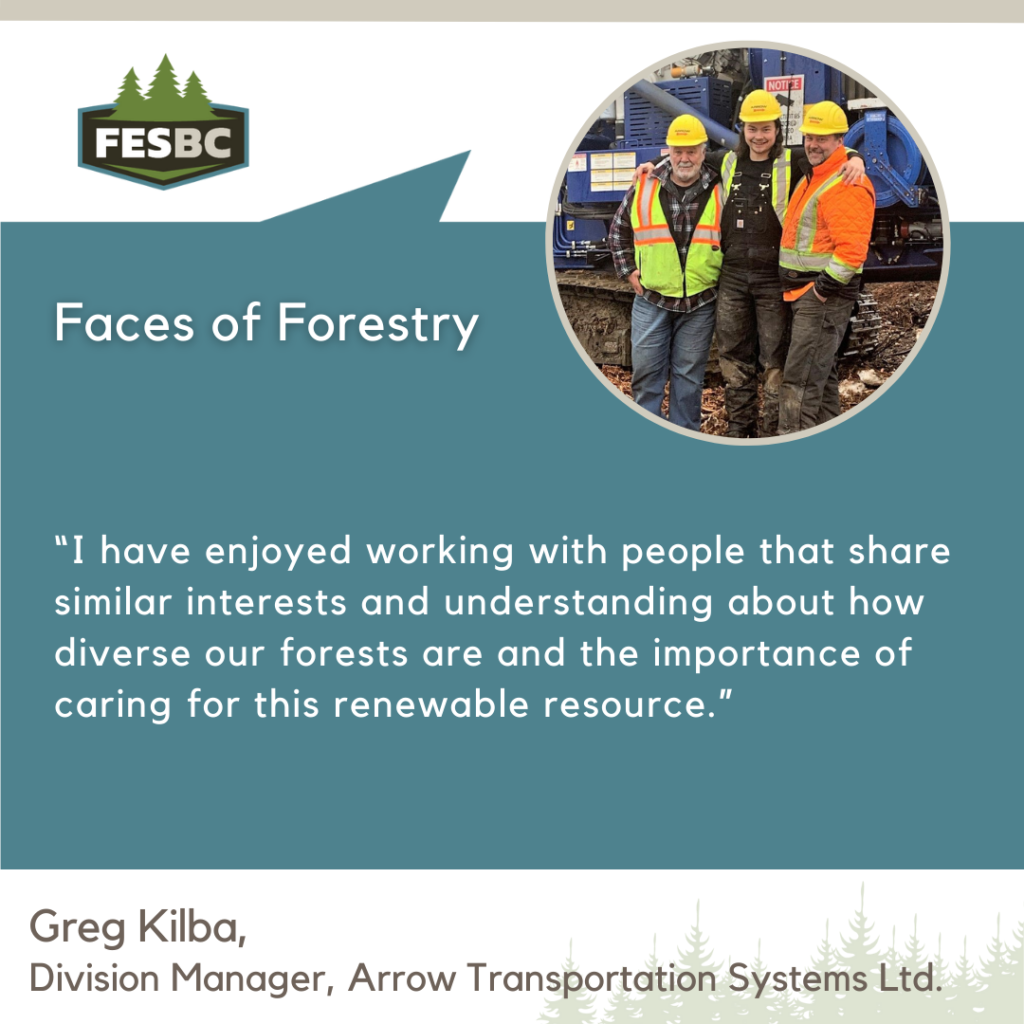Faces of Forestry is an initiative of the Forest Enhancement Society of BC (FESBC) to highlight people doing great work to enhance our forests throughout British Columbia. This month, we feature Greg Kilba, Division Manager, Portable Wood Processing and Log Buyer at Arrow Transportation Systems Ltd.
Guided by conversations with his grandad during his youth, Greg found his passion for forestry rooted in the numerous opportunities the field offered.

“There were a lot of pros, such as being able to work outside, learning about the diversity of our forests, understanding how our ecosystems work,” said Greg. “That seed that was planted in my brain at a young age grew and branched out. Over my career, I have luckily been able to learn many of the different aspects of Forestry.”
His early exposure to chainsaw operation and equipment handling in high school further helped set the foundation for essential skills and a profound appreciation for the dynamics of the forestry industry.
After graduating, Greg immersed himself in the industry, saving money by working on a logging show. His passion for forestry eventually led him to enroll in the Natural Resource Science Program in Kamloops, allowing him to continue his job as a young manager in silviculture while simultaneously studying.
At the age of 25, Greg’s curiosity and innovative nature led him to work as a forestry consultant for Weyerhaeuser and the Ministry of Forests, where one of his contracts was burning slash piles.
“I often thought that there had to be a way to harness the energy that was released when lighting a waste pile. It was therefore, a natural fit for me when I heard that they were grinding piles to generate hog fuel that could produce electricity,” he explained.
Currently, Greg manages Arrow’s grinding program in Kamloops and Fort St. James and purchases biomass logs for the grinder and chip plants. Within this role, he actively meets with many forest licensees to collectively work on agreements to utilize fibre that historically was burnt, striving to find the most economical ways of getting the low-value fibre to end users such as Kruger, BioNorth and Drax.
Over the years, he has developed numerous proposals with FESBC, collaborating on projects that have created new well-paying jobs to support the local economy, promoted renewable energy, and minimized environmental impacts.
“FESBC is like no other forestry program that I have been involved in as the funding is incrementally based and a very high percentage of the biomass fibre is paid for by industry. This assistance has allowed us to utilize fibre that was just outside of industries’ economic reach,” noted Greg.
Throughout his career, Greg has appreciated the opportunity to work with like-minded individuals who strive to turn challenges into opportunities.
“I have enjoyed working with people that share similar interests and understanding about how diverse forests are and the importance of caring for this renewable resource.”
In the face of media attention that often focuses on challenges in forestry, Greg underscores the industry’s dedication to sustainable practices. He emphasizes how, since the mountain pine beetle epidemic, the industry has found ways to utilize fibre that would have otherwise been burnt, contributing to the production of lumber, pulp and paper products, and biomass energy.
Thank you, Greg, for your dedication to environmental stewardship and innovative solutions for waste pile energy. Your tireless efforts are undoubtedly shaping a sustainable future of our forests.
